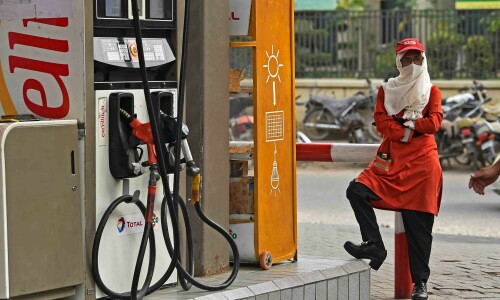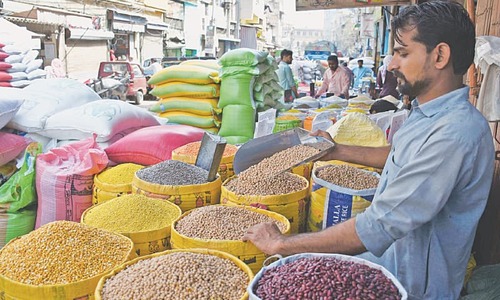THE bloodbath at the stock market on Thursday is just another grim reminder of all that is wrong with the economy. The fundamentals continue to worsen — faster than before — as the country hurtles towards yet another financial disaster amid political uncertainty.
The fresh losses suffered by the stock market over the last few days are just one symptom of declining economic conditions exacerbated by electoral uncertainty. The KSE-100 Index is said by market watchers to have lost almost 1,250 points over concerns of another potential hike in interest rates because of changing expectations regarding inflation as the rupee depreciates and power rates surge.
The already ‘fragile’ investor sentiment also took a hit after the caretaker finance minister warned of a further hike in electricity and fuel rates, and asserted that the government did not have the fiscal space for subsidies.
During her appearance before a Senate panel on Wednesday, she said there was little choice but to adhere to the IMF programme. Could the stock market bloodbath have been avoided had she not spoken the truth? Experts familiar with the state of the economy are not convinced.
Likewise, the exchange rate is again sliding after a brief respite following the approval of the new $3bn short-term bailout loan from the IMF. The rupee is under pressure due to the surging import bill, the international rise of the dollar, and the interbank market endlessly chasing the open market rate of the latter currency to keep the gap below 1.25pc to meet a key IMF goal.
The rupee has lost nearly 26pc of its value since the start of 2023. Again, could turbulence in the foreign exchange market have been prevented had the IMF not imposed its condition to narrow the gap between the interbank and open markets? Not without letting the gap between the two markets widen to an unsustainable level.
Investors have been closely monitoring the country’s balance-of-payments position because the next review by the IMF will not happen for a few months, and there is not much clarity over the planned investments from the Gulf nations. That means foreign capital inflows will remain subdued, at least over the next several months, which would prolong the pressure on the rupee.
The main question is: can the caretakers stop the economic decline? With their limited mandate and powers, it looks unlikely. The current state of the economy demands tough decisions that a temporary set-up is not capable of making.
The rupee will keep shedding value, inflation will remain elevated, and stocks will continue to suffer mounting losses unless the prevailing election uncertainty ends, and a stable new elected government takes over with the mandate to take difficult decisions. Meanwhile, we continue our journey towards a bigger economic disaster.
Published in Dawn, September 1st, 2023














































Dear visitor, the comments section is undergoing an overhaul and will return soon.